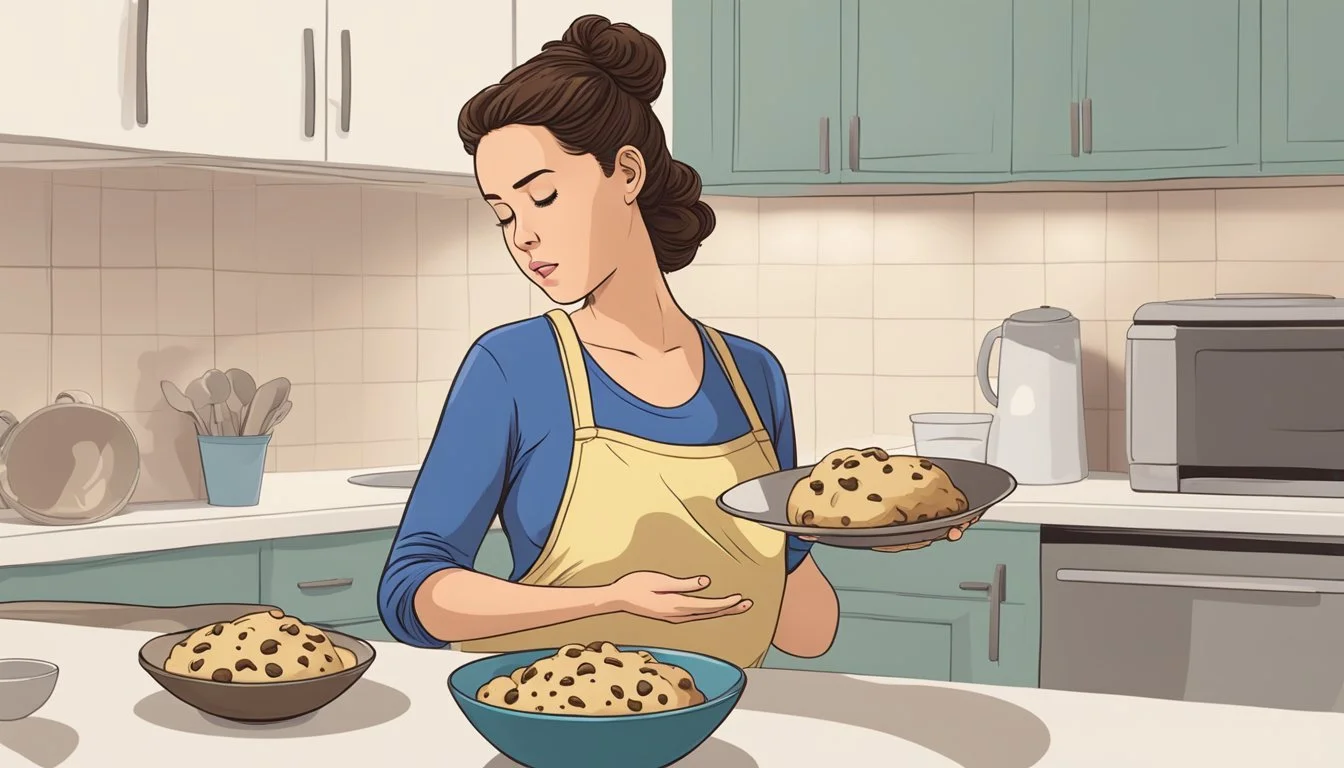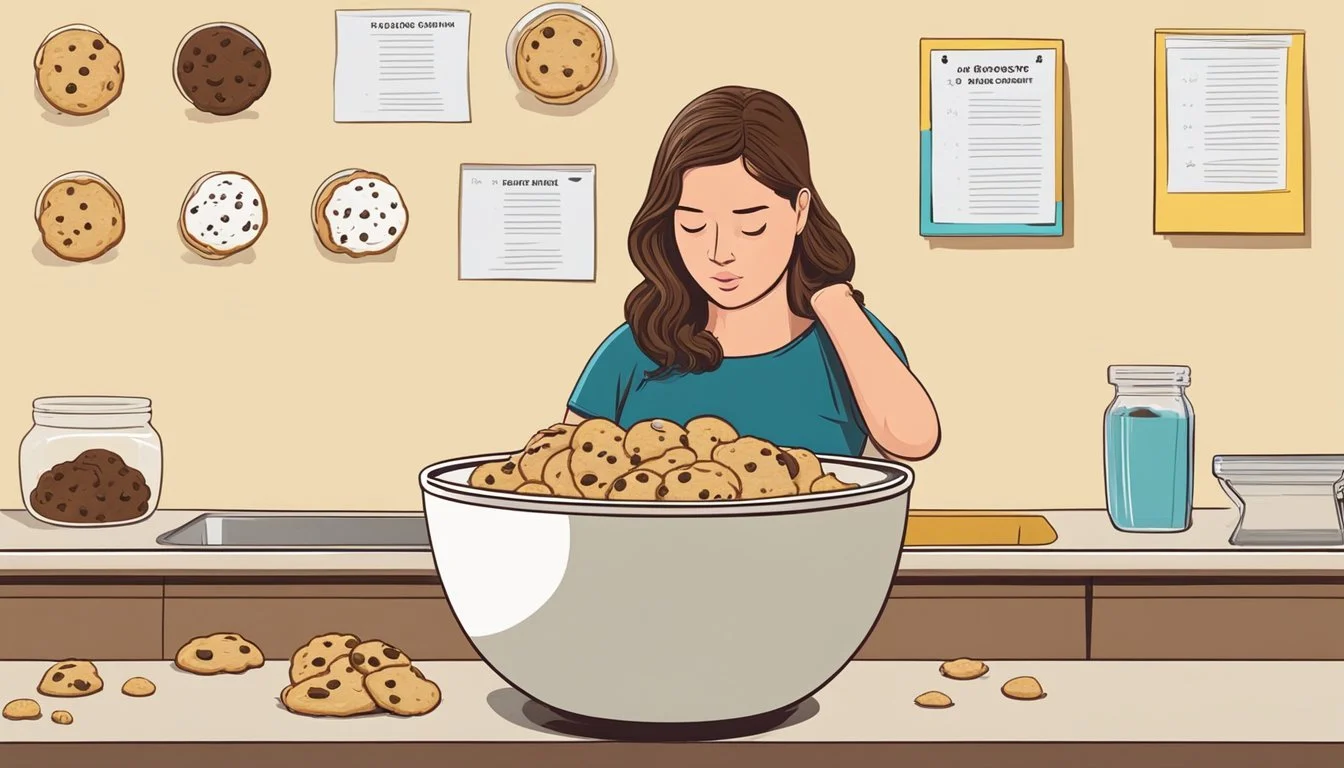Is it Safe to Eat Raw Cookie Dough During Pregnancy?
Understanding the Risks
Eating raw cookie dough during pregnancy raises important health considerations. Raw or undercooked eggs, commonly found in cookie dough, pose a risk of salmonella infection. While the risk associated with raw eggs has been mitigated in certain regions through the implementation of food safety standards, such as the Lion mark in the United Kingdom guaranteeing eggs have been vaccinated against salmonella, there remains an additional concern regarding raw flour.
Flour, a core ingredient in cookie dough, is not a sterile product and may contain bacteria such as E. coli. When flour is cooked, potential bacteria are killed, which is why baked goods are safe to consume. However, raw cookie dough, containing uncooked flour and sometimes eggs, presents a dual risk for pregnant women. It is advised that they avoid the consumption of raw dough to prevent possible foodborne illnesses that could affect both the mother and developing fetus.
Risks of Eating Raw Cookie Dough During Pregnancy
Eating raw cookie dough during pregnancy poses health risks due to the potential presence of harmful bacteria in raw eggs and flour. These bacteria can cause foodborne illnesses, which are particularly dangerous for expectant mothers and their unborn children.
Raw Eggs and Salmonella
Raw eggs can contain Salmonella, a type of bacteria that causes salmonellosis. Infection can lead to:
Fever
Diarrhea
Stomach cramps
Vomiting
Pregnant individuals are particularly vulnerable, and the severity of the symptoms could lead to hospitalization. Consuming fully cooked eggs where yolks and whites are firm reduces the risk of Salmonella.
Raw Flour and E. Coli
Uncooked flour is not a sterile product and hence can be contaminated with Escherichia coli (E. coli). Ingesting raw flour by consuming raw cookie dough can result in:
E. coli infection
Severe stomach cramps
Diarrhea, often bloody
Vomiting
These symptoms are especially concerning during pregnancy, as an E. coli infection can lead to serious complications, including premature labor or illness in newborns.
General Health Risks
The general health risks associated with consuming raw cookie dough during pregnancy include exposure to foodborne illnesses which can compromise the immune system. Pregnant women have a heightened risk of severe illness and outcomes from these infections. The presence of harmful bacteria in raw cookie dough makes it an unsuitable choice during pregnancy. It's advisable to avoid any foods that may contain raw ingredients such as cookie dough and batter to ensure the health and safety of both the mother and the developing fetus.
Understanding Foodborne Illness
Foodborne illness poses a significant risk during pregnancy due to the heightened susceptibility to certain pathogens that can have adverse effects on both the mother and the unborn child.
Pathogens in Pregnancy
Pregnant women need to exercise extra caution as their immune systems are altered, making them more vulnerable to foodborne pathogens such as Listeria monocytogenes, Salmonella, and E. coli. These pathogens can be present in a variety of foods, including raw cookie dough that typically contains raw eggs and untreated flour. Listeria can be particularly dangerous during pregnancy, leading to miscarriages, stillbirths, or severe infections in newborns. Salmonella and E. coli, while sometimes causing only mild illness in non-pregnant individuals, can lead to more severe complications during pregnancy.
Listeria monocytogenes: Can cause listeriosis, a serious infection.
Salmonella: May lead to salmonellosis, characterized by gastrointestinal distress.
E. coli: Certain strains may result in severe abdominal cramps, diarrhea, and vomiting.
Symptoms and Complications
The symptoms of foodborne illnesses can include fever, abdominal pain, nausea, vomiting, and diarrhea. In pregnant women, these symptoms can be more pronounced and can lead to severe dehydration or even preterm labor. The risks and complications associated with foodborne illnesses during pregnancy underscore the importance of safe food handling and consumption practices.
Symptoms for Pregnant Women:
Fever
Nausea
Vomiting
Diarrhea
Possible Complications:
Dehydration
Preterm labor
Adverse fetal effects
It is critical for pregnant women to avoid foods that are likely to harbor these pathogens, including raw or undercooked meats, unpasteurized dairy products, and raw cookie dough.
Safe Dietary Practices for Pregnant Women
During pregnancy, making safe food choices is crucial to the health of both the pregnant individual and the developing fetus. It's essential to understand the importance of pasteurization, selecting safe ingredients, and maintaining stringent kitchen hygiene.
The Role of Pasteurization
Pasteurization is a process that heats food and liquid to a specific temperature to kill harmful bacteria. For pregnant women, consuming pasteurized products is vital, particularly when it comes to dairy and egg products. Pasteurized eggs should be used in any recipe that calls for raw or lightly cooked eggs, as this reduces the risk of salmonella infection. Similarly, all dairy products should be sourced from pasteurized milk to prevent foodborne illnesses.
Selecting Safe Ingredients
When choosing ingredients, pregnant women should prioritize freshness and safety. Meats, including poultry, should be thoroughly cooked, until there is no pink meat and the juices run clear, and should be checked with a food thermometer for an internal temperature as recommended by food safety guidelines. For produce, fruits and vegetables should be properly washed. Leftovers and takeout should be stored in the refrigerator within two hours after cooking, marked with labels, and eaten within 24 hours to ensure they remain safe-to-eat.
Meat: Cook until appropriate internal temperatures are reached (e.g., 165°F for poultry).
Produce: Wash thoroughly under running water.
Leftovers: Store promptly and reheat to 165°F before consuming.
Kitchen Hygiene and Handling
Maintaining a clean kitchen, practicing good food safety habits, and proper food handling are imperative. Pregnant women should ensure all cooking surfaces and utensils are sanitized to prevent cross-contamination. Hand washing before and after handling food helps minimize the risk of foodborne illnesses. It's important to adhere to these guidelines consistently to maintain overall health throughout pregnancy.
Surfaces: Clean and sanitize before use.
Utensils: Use separate utensils for raw and cooked foods.
Hands: Wash thoroughly with soap and water before and after handling food.
Alternatives to Traditional Cookie Dough
Pregnant individuals seeking the indulgence of cookie dough have safe options with both edible cookie dough products and cautious homemade preparation.
Edible Cookie Dough Options
Edible cookie dough is a product specifically designed to be consumed raw. These versions are safe to eat as they are made without raw eggs and typically use heat-treated flour to eliminate the risk of foodborne pathogens. Grocery stores often carry a variety of ready-to-eat foods, including brands like Pillsbury and DŌ, which cater to the demand for safe, raw cookie dough consumption. The Food and Drug Administration (FDA) monitors these products for safety, ensuring they are suitable for consumption even when pregnant.
Homemade vs. Store-Bought
When it comes to homemade raw cookie dough, the key difference is in the preparation method to ensure safety. A safe-to-eat recipe would involve using pasteurized eggs or no eggs at all, and heat-treating flour to kill any bacteria. Heat-treated flour can be made at home by toasting it in the oven, reducing the risk of E. coli contamination. Store-bought edible cookie dough has the advantage of being professionally prepared and is often rigorously tested to adhere to regulatory safety standards, making it a convenient and generally safer option during pregnancy.
Pregnancy-Friendly Cookie Dough Recipes
When crafting cookie dough recipes for pregnant individuals, safety is paramount. Opting for pasteurized ingredients and heat-treatment methods ensures the elimination of harmful bacteria, providing peace of mind and a delicious experience.
Using Pasteurized Ingredients
To reduce the risk of foodborne illness, one should choose pasteurized eggs which undergo a process that destroys potentially dangerous bacteria without cooking the egg. Using pasteurized eggs is straightforward:
Eggs: For any cookie dough recipe calling for raw eggs, swap in pasteurized eggs to maintain the texture and binding properties.
Milk and Dairy Products: When the recipe requires milk, one should opt for pasteurized milk and dairy products only. This ensures the dough remains safe for consumption.
Heat-Treatment Methods
Flour is often overlooked as a source of contamination, yet it too can harbor harmful bacteria like E. coli. A crucial step for pregnancy-friendly cookie dough is heat-treating the flour. Below are basic instructions for heat treatment:
Baking: Spread flour on a baking tray and bake at 350°F (175°C) for about 5 minutes.
Microwaving: Place flour in a microwave-safe dish and heat on high until it reaches 160°F (71°C), stirring every 30 seconds to avoid burning.
After heat treatment, the flour must be cooled completely before use. This process ensures the flour is safe and retains its properties for cookie dough recipes.
Conclusion
The safety of consuming raw cookie dough during pregnancy is a subject of concern due to health risks. The primary components that present these risks are uncooked flour and raw eggs. Uncooked flour may harbor harmful bacteria such as E. coli, while raw eggs carry a risk of salmonella infection.
It is important for pregnant individuals to adhere to food safety guidelines to prevent foodborne illnesses. Although eggs bearing safety marks like the Lion stamp have been deemed safe since October 2017, the potential presence of dangerous bacteria in other raw ingredients remains a steadfast concern.
To mitigate risks, those pregnant may choose edible cookie dough products designed for consumption without baking, which are made with heat-treated flour and pasteurized eggs. Alternatively, creating homemade cookie dough with similar substitutes can yield a safer edible product.
In summary, it is advisable to avoid traditional raw cookie dough during pregnancy. By opting for alternatives that remove the hazards posed by uncooked ingredients, pregnant individuals can enjoy cookie dough safely.
Ingredient Risk Safe Alternative Uncooked Flour E. coli Heat-treated Flour Raw Eggs Salmonella Pasteurized Eggs or Egg Substitutes
In all instances, consulting with a healthcare provider for personalized advice is recommended.





